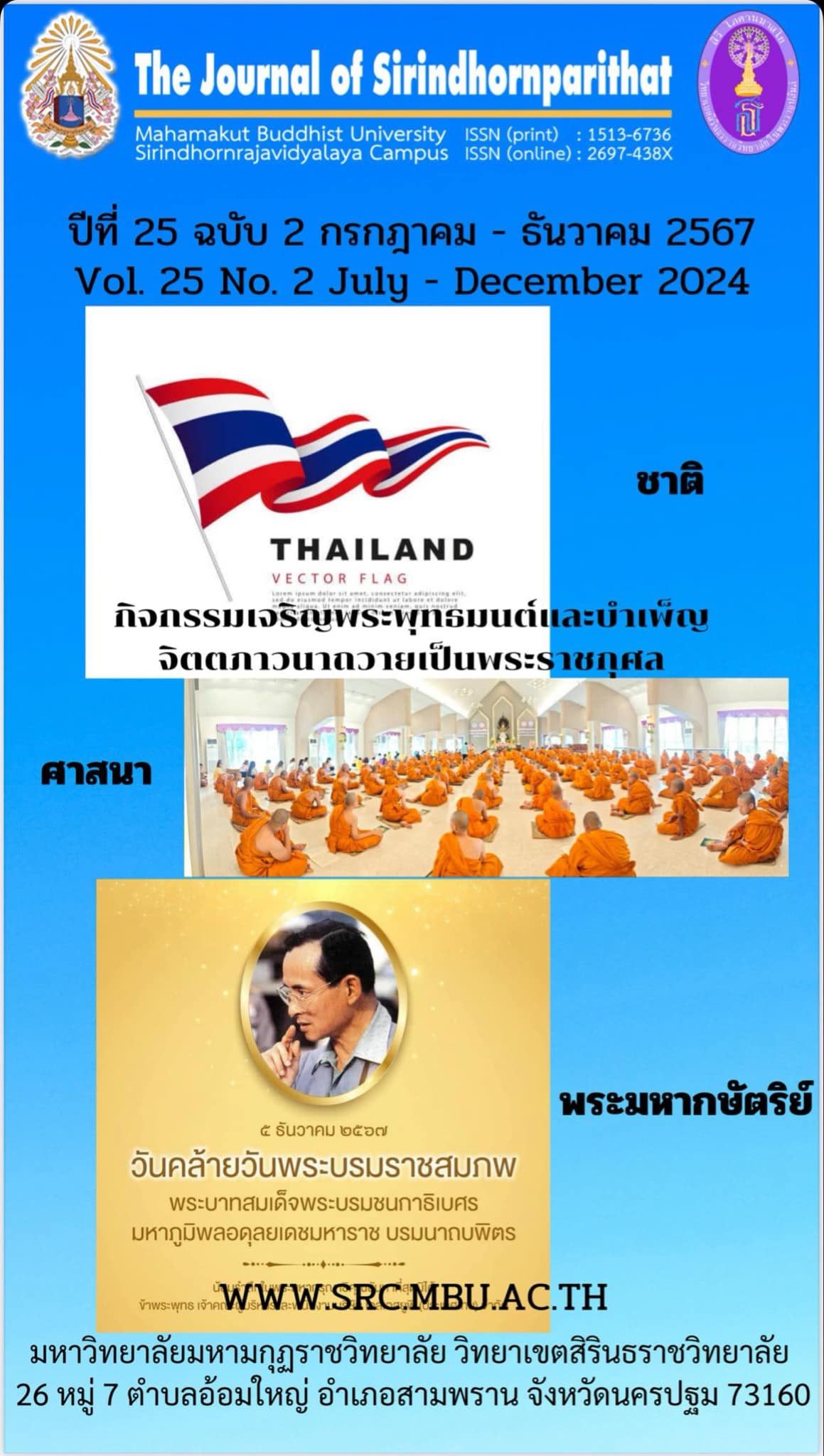The Relationship Between Digital Leadership Of School Administrators And Internal Supervision In School Of Anubanwatbangnangbun School
Keywords:
Digital Leadership of School Administrators, Internal Supervision in SchoolAbstract
This research purpose were to 1) study digital leadership of secondary school Administrator in Anubanwatbangnangbun School 2) study the level of supervision within the educational institution of Anubanwatbangnangbun School. 3) study the relationship between digital leadership of school administrators and internal supervision of Anubanwatbangnangbun School. The samples used in this research were administrators and teachers of Anubanwatbangnangbun School, academic year 2023, number 42 people. The research tool was a questionnaire. The statistics used in the research were frequency, percentage, mean, standard deviation. and the Pearson correlation coefficient analyzed by the program.
The results showed that 1) Overall digital leadership of school administrators is at a high level. When considering each aspect, it was found that It is at a high level in all 4 areas. ranked from the average to the lowest, Having a digital vision, working together, creating learning innovations in the digital world, understanding of knowledge and digital skills. 2) Overall supervision within the educational institution of Anubanwatbangnangbun School is at a high level. When considering each aspect, it was found that It is at a high level in all 5 areas. ranked from the average to the lowest, Including planning and Set options, Internal supervision operations Study of current conditions, problems, and needs Expanding the results and glorify and evaluation of supervision. 3) The relationship between leadership in the digital age of educational institution administrators and internal supervision of the educational institution of Anubanwatbangnangbun School. There was a high positive correlation equal to .589 with statistical significance at the .01 level.
References
กระทรวงศึกษาธิการ. 2560. แนวทางการปฏิรูปการศึกษา. เอกสารอัดสำเนา.
ดาวรุวรรณ ถวิลการ. (2564). ภาวะผู้นำดิจิทัล Digital Leadership. ขอนแก่น: มหาวิทยาลัยขอนแก่น.
สุกัญญา แช่มช้อย. (2561). การบริหารสถานศึกษาในยุคดิจิทัล. กรุงเทพฯ: โรงพิมพ์แห่งจุฬาลงกรณ์มหาวิทยาลัย.
สุกัญญา แช่มช้อย. (2558). ภาวะผู้นําทางเทคโนโลยีการนําเทคโนโลยีสู่ห้องเรียนและโรงเรียนในศตวรรษที่ 21. วารสารศึกษาศาสตร์ มหาวิทยาลัยนเรศวร.
สงัด อุทรานันท์. (2530). การนิเทศการศึกษาหลักการ ทฤษฎีและปฏิบัติ. (พิมพ์ครั้งที่ 2). กรุงเทพฯ:
โรงพิมพ์มิตรสยาม.
ทินกร บัวชู, ทิพภาพร บัวชู. (2562). ภาวะผู้นำดิจิทัลของผู้บริหารสถานศึกษา The Status of Digital Leadership of Education Management Administrators. วารสารครุศาสตร์สาร: Journal of Educational Studies.
เอกรัตน์ เชื้อวังคํา, วัลลภา อารีรัตน์. (2564). องค์ประกอบของภาวะผู้นําดิจิทัลของผู้บริหารสถานศึกษาสังกัดสํานักงานเขตพื้นที่การศึกษาประถมศึกษาอุดรธานีเขต 4. การประชุมผลงานวิชาการระดับบัณฑิตศึกษาแห่งชาติครั้งที่ 22. มหาวิทยาลัยขอนแก่น.
สุจรรยา ขาวสกุล. (2564). การพัฒนาดัชนีชี้วัดภาวะผู้นำดิจิทัลของผู้อำนวยการโรงเรียนสังกัดสำนักงานเขตพื้นที่การศึกษาประถมศึกษา. สิกขา วารสารศึกษาศาสตร์.
Sullivan, L. (2017). 8 Skills Every Digital Leader Needs. https://www.cmswire.com/digital-workplace/8-skills-every-digital-leader-needs/.
Elliott,T.(2017). Digital Leadership: A Six-Step Framework for Transformation. http://www.digitalistmag.com/author/telliott.
Zhu, P. (2016). Five Key Elements in Digital Leadership. http:// futureofcio.blogspot.com/ 2015/01/five-key-elements-in-digitalleadership.html.
International Society for Technology in Education (2018). ISTE STANDARDSFOREDUCATION LEADERS. https://www.iste.org/standards/foreducationleaders.
Juan Narbona. (2016). Digital leadership. Twitter and Pope Francis. CHURCH, COMMUNICATION AND CULTURE.
Downloads
Published
Issue
Section
License
Copyright (c) 2024 Mahamakut Buddhist University

This work is licensed under a Creative Commons Attribution-NonCommercial-NoDerivatives 4.0 International License.
บทความที่ได้รับการตีพิมพ์เป็นลิขสิทธิ์ของ มหาวิทยาลัยมหามกุฏราชวิทยาลัย วิทยาเขตสิรินธรราชวิทยาลัย
ข้อความที่ปรากฏในบทความแต่ละเรื่องในวารสารวิชาการเล่มนี้เป็นความคิดเห็นส่วนตัวของผู้เขียนแต่ละท่านไม่เกี่ยวข้องกับหาวิทยาลัยมหามกุฏราชวิทยาลัย วิทยาเขตสิรินธรราชวิทยาลัย และคณาจารย์ท่านอื่นๆในมหาวิทยาลัยฯ แต่อย่างใด ความรับผิดชอบองค์ประกอบทั้งหมดของบทความแต่ละเรื่องเป็นของผู้เขียนแต่ละท่าน หากมีความผิดพลาดใดๆ ผู้เขียนแต่ละท่านจะรับผิดชอบบทความของตนเองแต่ผู้เดียว




